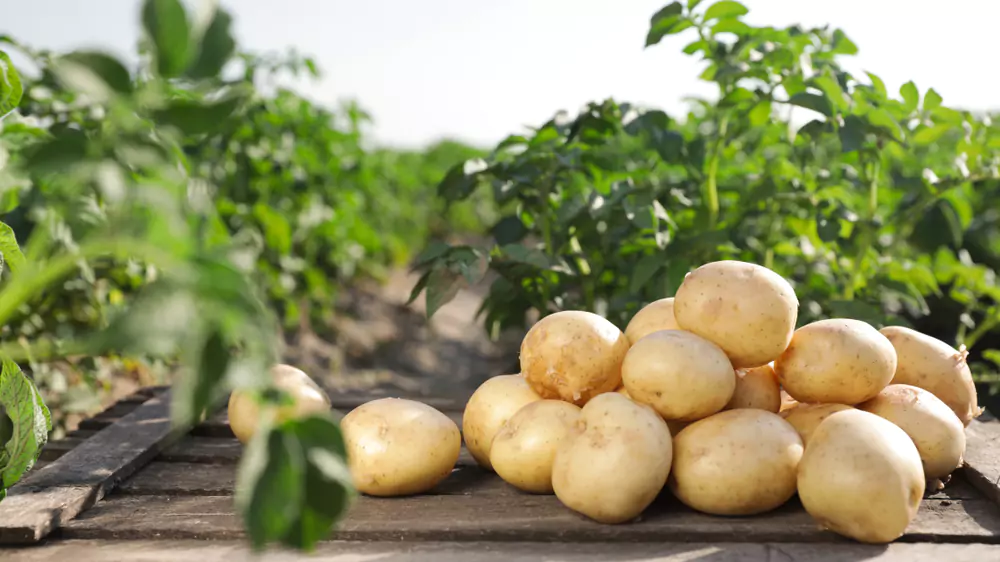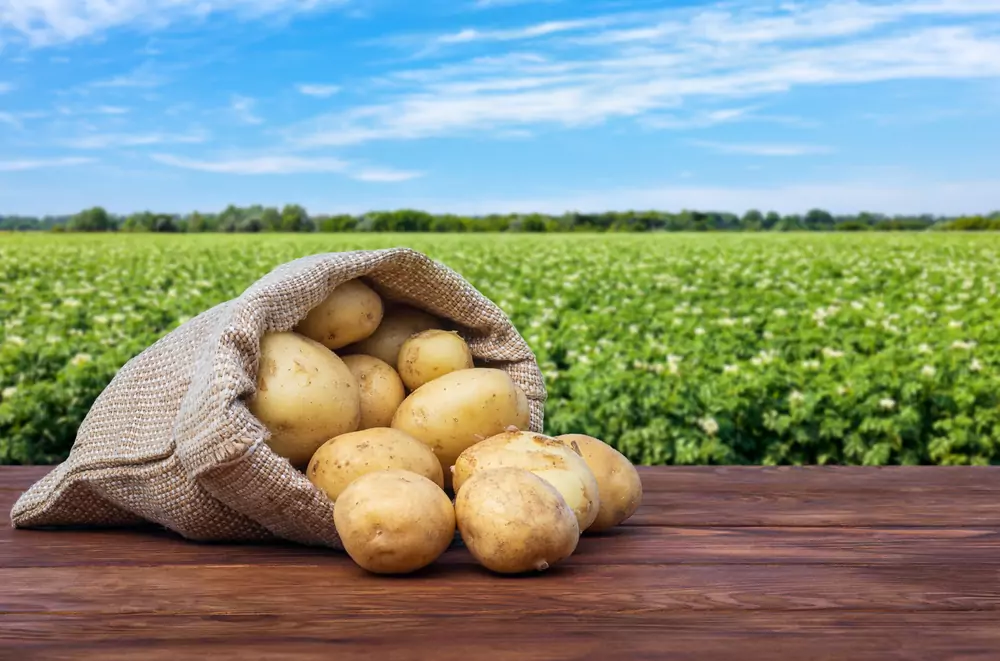In the quest for a gluten-free lifestyle, the question often arises: Are potatoes gluten-free? Whether you’re navigating gluten sensitivity, celiac disease, or simply adopting a gluten-free diet, understanding the role of potatoes is crucial.
In this article, we’ll peel back the layers to explore the gluten content of potatoes and shed light on potential sources of gluten that might sneak into your spud-centric meals. Let’s dig into the facts and myths surrounding the gluten-free status of our beloved potatoes.
Composition Of Potatoes
Potatoes are a versatile and nutritious vegetable composed mainly of water, carbohydrates, and a small amount of protein. They are a rich source of essential nutrients like vitamin C, potassium, and vitamin B6. The potato’s skin contains fiber and additional nutrients, while the flesh provides energy in the form of starch. Potatoes also contain trace amounts of minerals and antioxidants. Their composition makes them a valuable part of a balanced diet, contributing to overall health and well-being.
Are Potatoes Gluten Free?
Yes, potatoes are naturally gluten-free. Gluten is not present in the composition of potatoes, making them a safe and versatile food choice for those who need to avoid gluten due to sensitivity or celiac disease. Whether baked, mashed, or fried, potatoes can be enjoyed without worrying about gluten content.
However, it’s essential to be cautious with processed potato products, such as certain potato chips or fries, as they may be cross-contaminated during production. However, potatoes are a gluten-free and nutritious meal option in their natural state.
Varieties Of Potatoes That Contain Gluten

Potatoes are generally considered to be gluten-free. However, some varieties of potatoes do contain gluten. These varieties are “gluten-containing potatoes” or “gluten-tolerant potatoes.”
The most common types of gluten-containing potatoes are:
Red potatoes
This type of potato is high in starch and has a red skin. They are often used in baked, mashed, and other dishes where their color and texture add flavor and visual appeal.
Yukon gold potatoes
This is another popular variety of potato known for its buttery, yellow flesh, and smooth, thin skin. They are often used in boiled or mashed potatoes and can also be roasted or fried.
Russet potatoes
These are the most commonly grown variety of potatoes in North America, and they are known for their brown, rough skin and high starch content. They are often used in french fries, baked potatoes, and other dishes with a desired crispy texture.
Specific Potato-Based Products That May Contain Gluten Additives
Potatoes are naturally gluten-free, but some potato-based products may contain gluten additives. It’s important for individuals with gluten sensitivities or celiac disease to be aware of these products to avoid any adverse reactions.
Here is a table of specific potato-based products that may contain gluten additives:
| Product Name | Potential Gluten Additives |
| Potato Chips | Malt vinegar, wheat starch |
| Potato Bread | Wheat flour, barley malt |
| Potato Gnocchi | Wheat flour |
| Potato Dumplings | Wheat flour |
| Potato Pancakes | Wheat flour |
| Potato Salad Dressing | Wheat-based thickeners |
Can Potatoes Be Contaminated With Gluten During Process?

Yes, potatoes can potentially be contaminated with gluten during processing. While potatoes themselves are naturally gluten-free, the risk arises during various stages of processing and preparation. Cross-contamination may occur if the same equipment or surfaces are used to handle both potatoes and gluten-containing products.
For instance, in facilities that process various foods, equipment used for wheat-based products could introduce gluten particles to potatoes. Individuals with gluten sensitivities or celiac disease need to be mindful of this possibility and choose processed potato products carefully, checking for potential cross-contamination in the manufacturing process.
Common Foods That Contain Gluten
Gluten is a protein found in wheat, barley, rye, and their derivatives. For individuals with celiac disease or gluten sensitivity, it is crucial to be aware of the common foods that contain gluten. Here is a table of some common foods that typically contain gluten:
| Food Group | Common Foods That Contain Gluten |
| Grains | Wheat, barley, rye |
| Baked Goods | Bread, cakes, cookies |
| Pasta | Spaghetti, macaroni |
| Cereals | Wheat-based cereals |
| Processed Foods | Soups, sauces, salad dressings |
| Snack Foods | Pretzels, crackers |
| Beverages | Beer, malt beverages |
Why Go Gluten-Free?
People choose to go gluten-free for various reasons. Some individuals have gluten sensitivity or celiac disease, conditions where consuming gluten can lead to digestive issues or damage to the small intestine. Others may adopt a gluten-free diet for general health reasons or to address certain symptoms.
Going gluten-free involves avoiding foods containing wheat, barley, rye, and derivatives. While it’s crucial for those with gluten-related conditions, it’s essential to ensure a well-balanced diet by incorporating gluten-free alternatives to meet nutritional needs.
Tips For Eating Potatoes If You Avoid Gluten
Here are five tips for incorporating potatoes into your gluten-free meals:
Choose Whole Potatoes
Opt for whole, unprocessed potatoes to ensure they are free from any potential cross-contamination with gluten-containing products.
Be Mindful of Seasonings and Condiments
When preparing potatoes, be cautious of the seasonings and condiments you use, as some may contain gluten. Stick to gluten-free options such as herbs, spices, olive oil, and homemade sauces.
Experiment with Different Cooking Methods
Explore various cooking methods such as baking, boiling, roasting, or grilling to add variety to your potato dishes while keeping them gluten-free.
Check Labels on Pre-Packaged Potato Products
If you opt for pre-packaged potato products such as frozen fries or hash browns, always read the labels carefully to ensure they are certified gluten-free.
Incorporate Potatoes into Balanced Meals
To create satisfying and nutritious dishes, include potatoes as part of well-balanced gluten-free meals by pairing them with lean proteins, vegetables, and healthy fats.
Gluten-Free Foods
Here is a table of gluten-free foods:
| Food Category | Gluten-Free Options |
| Grains | Rice, quinoa, corn, millet, sorghum, teff |
| Fruits and Vegetables | All fresh fruits and vegetables are naturally gluten-free |
| Proteins | Eggs, lean cuts of meat, poultry, fish, legumes |
| Dairy | Milk, cheese, yogurt (without added flavors or thickeners) |
| Fats and Oils | Olive oil, coconut oil, avocado oil, butter |
| Snacks and Sweets | Popcorn, nuts, seeds, gluten-free baked goods |
Conclusion
In conclusion, the truth about potatoes being naturally gluten-free remains steadfast. From mashed to fried, potatoes can be enjoyed by those with gluten sensitivities or celiac disease without worry. However, staying vigilant with processed potato products is essential, as cross-contamination risks exist during manufacturing.
Embracing the gluten-free nature of potatoes opens up a world of tasty meal possibilities while keeping health and dietary preferences in check. So, feel free to savor the simplicity of spuds, knowing that your favorite potato dishes are indeed a gluten-free delight.
FAQs
Can You Eat Potatoes On a Gluten-Free Diet?
Yes, you can eat potatoes on a gluten-free diet as they are naturally gluten-free.
Why Are Mashed Potatoes Not Gluten-Free?
Mashed potatoes are gluten-free, but additives or cross-contamination in processing can introduce gluten.
Do French Fries Have Gluten?
French fries can be gluten-free, but cross-contamination during frying or added coatings may contain gluten.
Are Tater Tots Gluten-Free?
Tater tots may not be gluten-free due to additives or cross-contamination, so checking product labels is essential.






